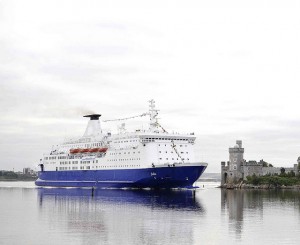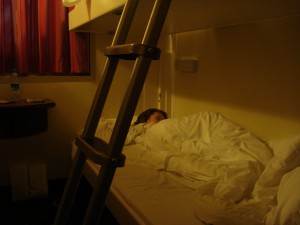
I was one of ten foot passengers on Fastnet Line’s new Swansea to Cork ferry three weeks ago. And three of those were my family members. Then a volcano erupted and, with it, thousands of travel plans. On our return journey we were among five hundred foot passengers, most of them wearing suits. The ferry staff were in shock, but patient, smiling, and helpful throughout.
As fellow passengers swapped ‘get me home’ stories, many were astounded at us travelling on the ferry by choice, rather than by circumstance. But I am used to that reaction now, as I reduced flying to a minimum a while back. But now everyone was getting a taster session, and experiencing a little of what it is to be a ‘green’ and ‘slow’ traveller.
Reactions were mixed, with the suits marching up and down ship corridors, as if to create a mass mantra of ‘faster, faster’. The ‘go with the flow’ types went on deck to enjoy the views of Cobh and Cork’s fine coastline, played cards with their kids, relaxed with a pint, or took out maps to see where the journey was taking them. A Clonakilty man, who had been meaning to try out the new ferry, told me that he probably would never have got round to it. He, like many I chatted with, loved his cabin, with its comfy beds, crisp white sheets, telly, and bathroom, and said he wished his kids had been there to share it with him. He was already contemplating later holiday plans to Devon and Cornwall, unaware until now how accessible they are.
There is no doubt that this period of flight-free reflection has been a positive experience for many. We have all heard stories of people embracing the ‘adventure’, and coming together to help each other get home. The website which I contribute to, www.greentraveller.com, has had a ten fold increase in traffic during the last week, with people needing urgent information on how to cross Europe overland, something we specialise in. It has been a great opportunity for us to show people the alternatives, providing all the information they need in a one-stop shop. The only downside is that many are not experiencing the real thing, with ferries and trains having to cope with exceptional circumstances. When we arrived into Swansea, for example, the suits sulked about the lack of taxis, or about the station bus waiting for all

passengers to disembark before heading to the station. Faster, faster, faster, they still chanted.
The slower the better has always been my chant when travelling. But it will take more than one cloud of ash to start a genuine sea change, I’m afraid. One woman, for example, a self-professed ‘package person’, booked trains and ferry back to UK from Marrakech when her flight was cancelled, but chickened out at the last minute, as the idea of two and a half days travel was just too terrifying. She gave her tickets to charity and waited for the next flight, beginning May. Another person I know couldn’t get back to work in London a few days into the crisis as she was ‘stuck’ in Ireland. And yet, on that very day, every single ferry company had availability. Are the Irish still in such denial that there is sea space, and not just polluted air space between the land masses?
However, like most people, I have enjoyed the cleaner blue skies, the slower pace, and grateful that I wasn’t dependent on a flight for an emergency situation. It has been fun sharing overland travel experiences via our website with people who hadn’t contemplated it before. If there is to be one silver lining to this cloud in the long term, I hope the powers that be wake up to a much needed, and long demanded by many, improvement in the infrastructure around ferry ports and trains. Such as regular buses to ports, bike spaces on trains, car hire at ferry ports, gangplanks for foot passengers as well as easy, centralised access to transport information online. And perhaps those people who always laugh when I suggest a tunnel under the sea between Ireland and UK might just start thinking about the possibilities. Or is that still blue skies thinking?
